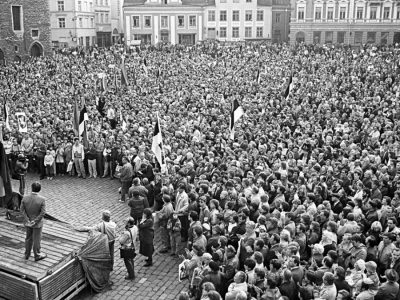(Pictured above are Russian soldiers training without rifles, showing a lack of production and resources within the country during World War I) Though it was not the only cause of the 1917 Revolutions, World War I played a large role in expediting the revolutions in the years prior to them. By 1917, Russia had taken … Continue reading The Stress of War Upon the 1917 Revolutions![]()
Category: 3rd Weekly Edition
Who is Vladimir Lenin?
by •
Hangry Russians: The Importance of Food Instability
by •
Effect of War Limited military training = disorganized, undisciplined army Mobilization of industry = hindrance on production “inflation and food shortages = dissatisfaction” (Freeze, 273) Unstable government = anxious lower/middle classes “Increasingly, the state lost the capacity of requisition of food, fuel, and manpower, reflecting the decline in its moral authority” (Freeze, 272). The … Continue reading Hangry Russians: The Importance of Food Instability![]()
From Revolution to Revolution
by •
The Revolution of 1917 had two parts to become the Communist Soviet Union that is typically thought of coming about after the tsar was abdicated. The February revolution created a provisional government that lasted for eight months. It was a more conservative government with ideals of liberal democracy. Its goal was to implement more liberal… Continue reading From Revolution to Revolution →![]()
The Kornilov Affair and the Rise of the Bolsheviks
by •
After escaping from a Hungarian prisoner-of-war (POW) camp in 1916, General Lavr Kornilov came back to Russia and found that the army needed a restoration of discipline. Appointed as the Commander-in-Chief of the army by Prime Minister Kerensky, Kornilov was determined to achieve his political goals while increasing the army’s fighting capacity (Freeze, 287). One […]![]()
“Let Them All Eat Cake”
by •

At the beginning of World War I, Russian officials gravely misjudged their ability to provide food during wartime and things started to decline within a year.On March 25th, the Provisional Government, after inheriting the food shortage issues, established a grain monopoly meaning that all grain was state property to be rationed as it saw fit… Continue reading “Let Them All Eat Cake” →![]()
The Peasants got Hangry
by •
Line at a Tobacco Store (1918). Corner of Prospect and Caravan Street, Petrograd, 1918. Source: Russian State Film & Photo Archive at Krasnogorks, 2000. This week I decided to focus on the food provisions that arose in Russia during … Continue reading →
The Kornilov Conundrum
by •
During the summer months of 1917, Russian Society was in the process of completely breaking down: workers frequently resorted to strikes and other disruptive behaviors that halted factory production, peasants seized land that did not belong to them, the upper class’s fears about chaos below them were manifested, and the government led by Kerensky … Continue reading The Kornilov Conundrum![]()
Peace, (Love?) Bread, Land, and Worker’s Control
by •
Peace and bread (America’s favorite carb) are not words commonly associated with Russia prior to the 1917 Revolutions. At the time: “In Russia, military setbacks, food shortages, popular unrest, and a crisis of political leadership brought about the abdication of the tsar and the demise of the Romanov dynasty in February, 1917” (Virginia Tech European … Continue reading Peace, (Love?) Bread, Land, and Worker’s Control![]()
